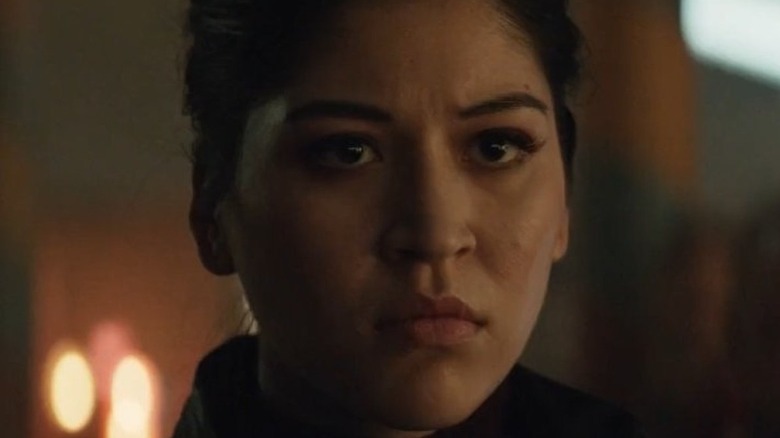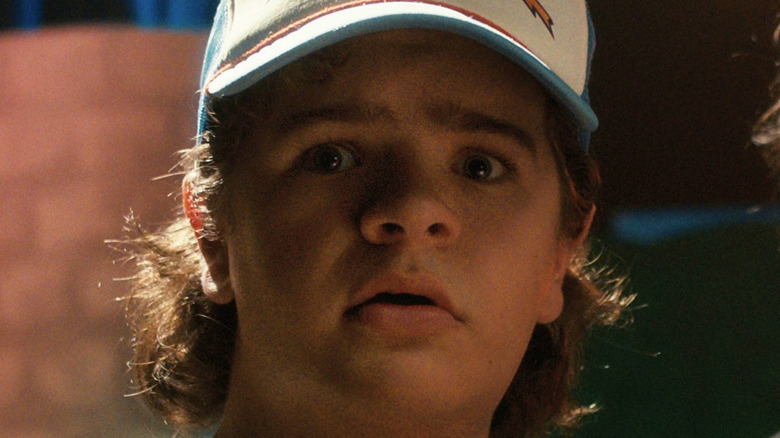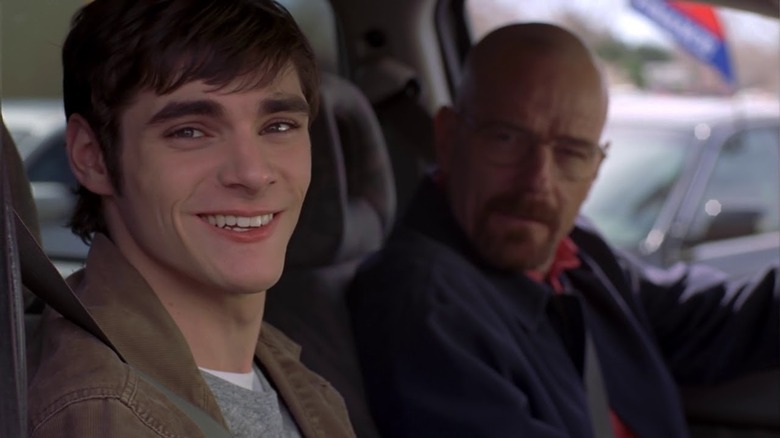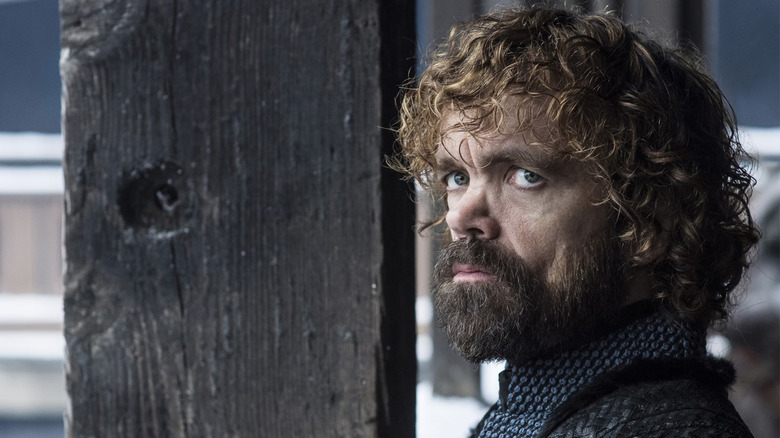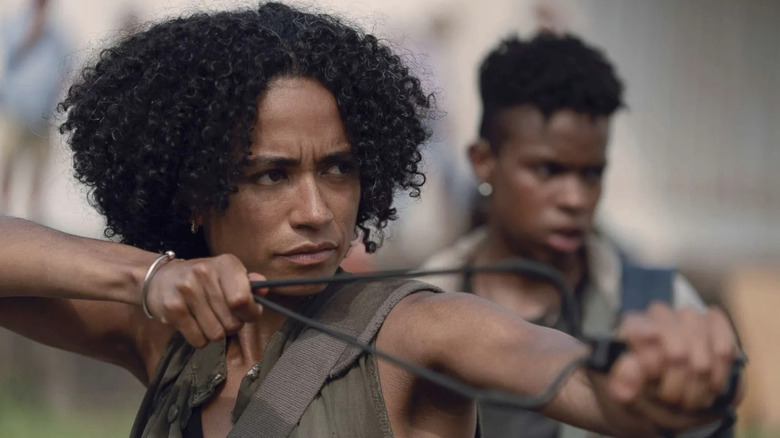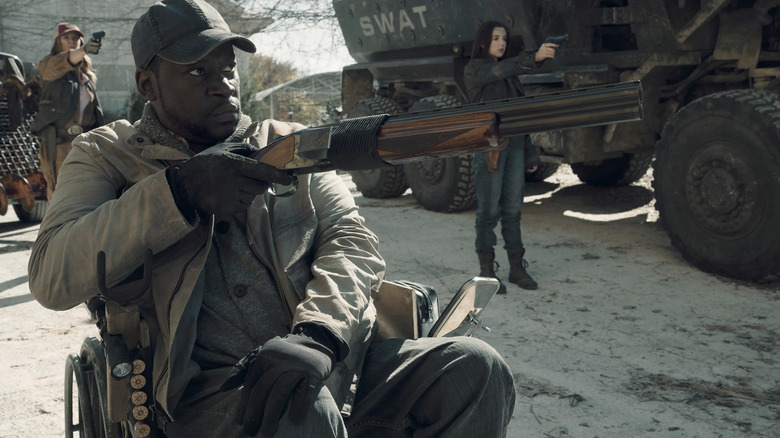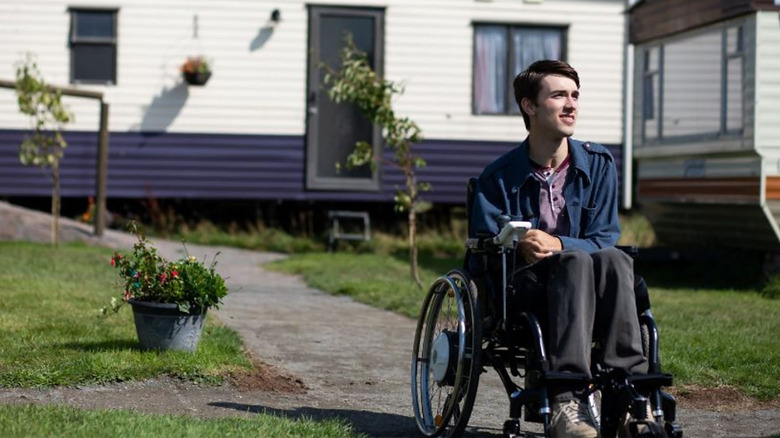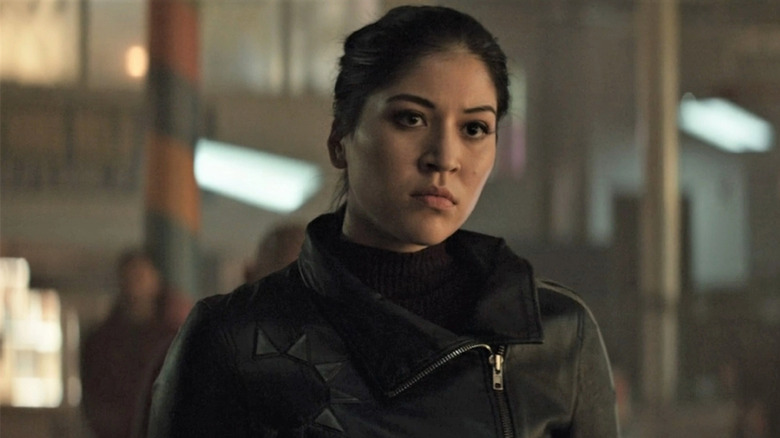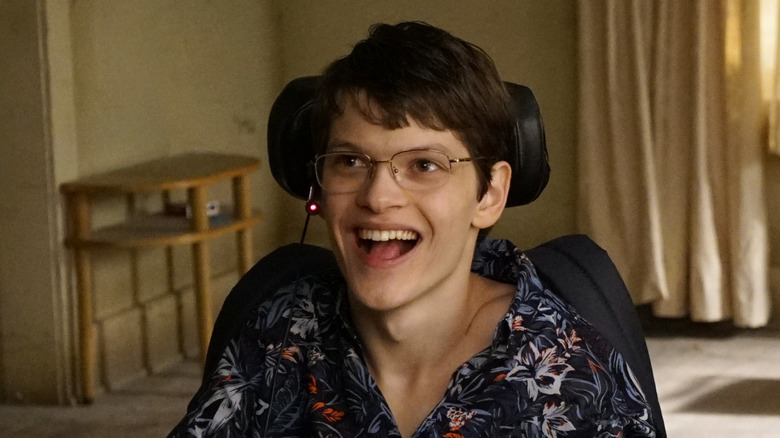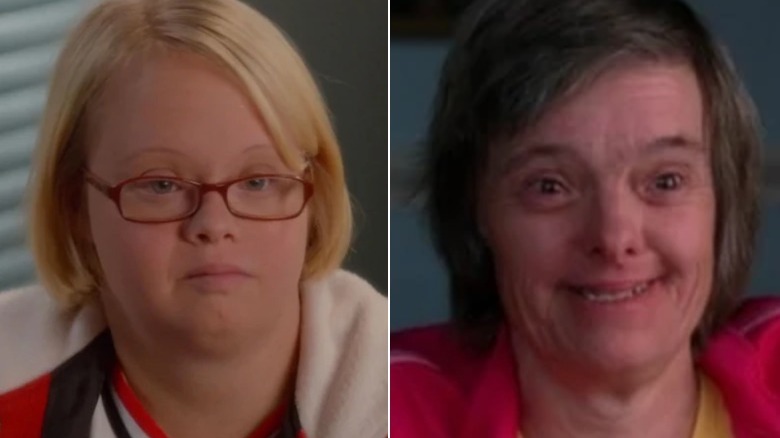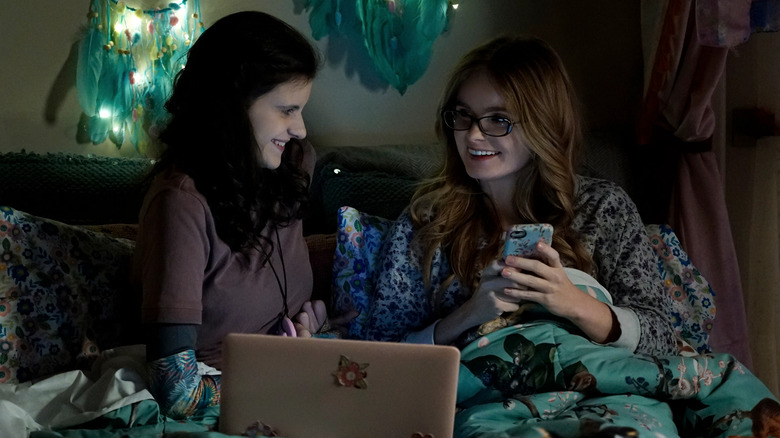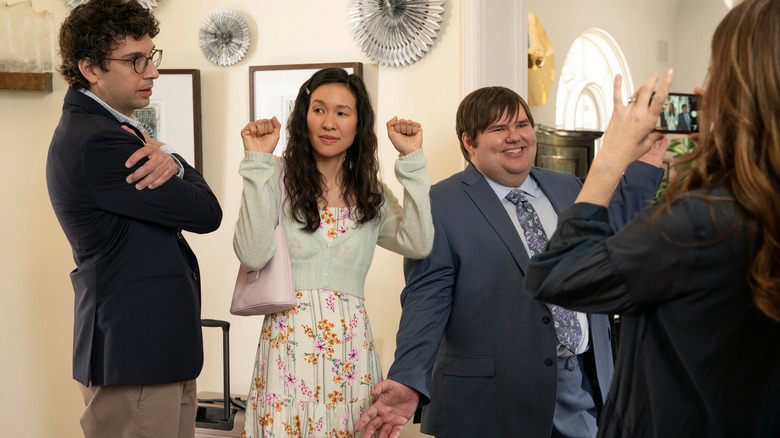TV Characters Who Have The Same Condition As The Actors Who Play Them
According to the CDC, approximately a fourth of all Americans have some condition or another that could be considered a disability. Despite this, disability remains extremely underrepresented on television: a GLAAD report on representation in TV notes that only 3.5% of characters in broadcast television shows during the 2020-2021 season had a disability — and that's the highest percentage GLAAD's annual reports have ever noted. Of this tiny fraction of TV characters, the majority are not played by actors with disabilities; a Ruderman Foundation study from 2016 found only 5% of TV characters with disabilities were played by actors with disabilities.
Fortunately, opportunities for actors with disabilities are increasing, and some of the best-loved characters on TV in recent years both have disabilities and are played by actors with the same condition as the characters. July is Disability Pride Month, so it feels particularly appropriate now to celebrate the following characters with disabilities and the actors with disabilities who play them. While there are aspects worth criticizing about several of the entries on this list, they have all, in their own way, broken ground for disabled representation.
Dustin (Stranger Things) - Gaten Matarazzo
Dustin Henderson from "Stranger Things" is a great example of a character who was not originally written as having a disability but was rewritten after an actor with a disability proved to be the best possible choice for the role. Gaten Matarazzo's funny, lovable performance instantly made the nerdy Dustin a fan favorite. Matarazzo has cleidocranial dysplasia, a condition that affects the development of bones and teeth, so after he was cast, this detail was worked into the character of Dustin, who's nicknamed "Toothless" and goes back and forth between using and not using dentures throughout the course of the series.
In an interview with The Daily Beast, Matarazzo said he got extremely positive reactions to "Stranger Things" from others with the same condition: "When they wrote it into the show, I [started] getting a lot of messages and emails online from people who have the condition, saying that it really helps them come out of their shells a little bit... They say that because this was in the show and this is the first time they've heard of it outside the doctor's office, it made them feel really good and it inspired them."
Walter Jr./Flynn (Breaking Bad) - RJ Mitte
One of the few characters in "Breaking Bad" who could reasonably be considered a "good person," Walter "Flynn" White Jr. is the son of schoolteacher-turned-meth kingpin Walter White Sr. At the start of the series, he loves his father almost as much as he loves a delicious breakfast. He even works to raise funds online for medical bills when he finds out about his dad's cancer diagnosis — a fund his dad secretly uses for money laundering. He's understandably extremely shaken when he finds out the truth about Walt Sr.'s crimes, and by the series finale, he's officially changed his name to his nickname, Flynn, to distance himself from his father.
Walter Jr./Flynn has cerebral palsy, uses crutches, and has speech difficulties. Actor RJ Mitte also has cerebral palsy, but his symptoms are milder. He explained in an AMC Q&A that he had to regress in his speech and physical therapy in order to portray the character: "I had to stay up real late so I could learn to blur my speech more. I had to learn how to use crutches so it didn't look like I'm faking walking. I didn't want to look like just another faker because I really have it." Mitte won the SAG-AFTRA Harold Russell Award in 2013 for his performance and contribution to disability representation.
Tyrion (Game of Thrones) - Peter Dinklage
Peter Dinklage has frequently criticized the ways actors with dwarfism have been pigeonholed by Hollywood into playing elves, leprechauns, and other cutesy fantasy creatures. According to a profile in The New York Times, he was initially skeptical about being cast in "Game of Thrones" due to these negative associations with fantasy roles for little people. However, he soon realized that Tyrion Lannister isn't part of some magical race but an actual human being with achondroplasia (the same condition as Dinklage), who has as many flaws and complexities as anyone else in the dark epic series.
The brilliant, underestimated strategist of House Lannister ended up becoming Dinklage's most iconic role, beloved by fans, critics, and awards voters alike. Tyrion is author George R.R. Martin's personal favorite character, and it's easy to understand why: his struggles as a disabled man challenging those who hate him for who he is made for some of the series' most emotionally compelling drama. Dinklage's performance as Tyrion was nominated for the best supporting actor Emmy for all eight seasons of "Game of Thrones," and he won for half of those years. Even if an underwhelming ending has tainted the show's legacy to some extent, it's without question that Dinklage's performance will remain celebrated as among the best in TV history.
Connie (The Walking Dead) - Lauren Ridloff
Connie, a deaf member of Magna's band of roaming survivors, was first introduced following the time skip in "The Walking Dead" Season 9 episode "What Comes After." She was part of the recurring cast through the rest of Season 9 and was promoted to a series regular in Seasons 10 and 11, the final two seasons of the AMC series. She always keeps a watchful eye on her surroundings, and her ability to communicate silently via American Sign Language proves advantageous in avoiding attention from walkers.
Like her character, actress Lauren Ridloff is deaf in real life. Her career has been booming — in 2018, the same year she made her "Walking Dead" debut, Ridloff was nominated for best performance by an actress in a leading role in a play at the Tonys for her role as Sarah Norman in a revival of "Children of a Lesser God." She's since appeared in the Oscar-winning drama "Sound of Metal" and played Makkari, the MCU's first deaf superhero, in "Eternals."
Wendell (Fear the Walking Dead) - Daryl Mitchell
"Fear the Walking Dead" started as a prequel series to "The Walking Dead," but by its fourth season, the spinoff started telling a concurrent story about different survivors across post-apocalyptic America. Wendell, played by Daryl Mitchell, is one of the survivors in Mississippi. He uses a wheelchair, which is equipped with a spike trap that can impale walkers.
Wendell was paralyzed at age 10, when he was hit by a car while trying to save another boy. He tried to join the Marines like his adoptive sister Sarah Rabinowitz but was rejected due to his disability (Sarah left the Marines in protest of this rejection). Mitchell, who starred in "Veronica's Closet" and "Galaxy Quest" in the '90s, was paralyzed due to a motorcycle accident in 2001 (via People Magazine). He's served as an ambassador for the Christopher and Dana Reeve Foundation, an organization that's working to find treatments for spinal cord injuries.
Isaac (Sex Education) - George Robinson
Improving representation of people with disabilities in the media means introducing a wide variety of characters with disabilities, including characters who aren't necessarily likable. Isaac Goodwin, introduced in Season 2 of Netflix's "Sex Education," is a good example of an authentically portrayed character with a disability who can also be kind of a jerk. He lies about the source of his quadriplegia, and in the Season 2 finale, he deleted Otis' voice message apologizing and confessing his love to Maeve. He later claims he did this to protect her from Otis, but for many viewers, it came across as him eliminating the competition and manipulating her into a relationship.
Even if fans hated Isaac and Maeve's relationship, however, its depiction was in many ways groundbreaking for the way it was able to destigmatize the sexuality of wheelchair users. The character was already intended to be disabled, but the writers chose not to decide on the character's specific disability until they cast actor George Robinson, who became quadriplegic after a rugby injury at age 17 (via Cherwell).
Ryan (Special) - Ryan O'Connell
Ryan O'Connell is the star, creator, and head writer of the Netflix comedy series "Special," based on his memoir "I'm Special: And Other Lies We Tell Ourselves." In the show, O'Connell plays a fictionalized version of himself, Ryan Hayes, navigating work, relationships, and identity as a gay man with cerebral palsy (his coworkers mistakenly believe Ryan's disability is due to being hit by a truck, a lie he keeps up until the Season 1 finale).
The first season of "Special" in 2019 was a short-form series with 15-minute episodes. It was positively reviewed by critics and won a Writers Guild of America Award for short form new media programming. However, like many Netflix shows, it was given a second season on the condition that said season would be the show's last — the show got "renanceled," as O'Connell put it in a Hollywood Reporter interview. Season 2 expanded to full half-hour episodes, a change O'Connell insisted on to allow for greater story and character development.
Echo (Hawkeye) - Alaqua Cox
Maya Lopez, a Native American villain-turned-superhero who goes by the name "Echo," is one of the most prominent deaf characters in the Marvel Comics universe. The Marvel Cinematic Universe version of the character, introduced in the "Hawkeye" Disney+ series and played by first-time actress Alaqua Cox, is also an amputee with a prosthetic leg. Initially introduced as the leader of the Tracksuit Mafia (she leaves the group after learning its leader/her adoptive uncle Kingpin killed her father), Echo makes for an intimidating yet sympathetic antagonist.
According to The Hollywood Reporter, Cox wasn't even considering an acting career until friends sent her Marvel's casting call seeking deaf Native American women for a role. It wasn't until halfway through filming "Hawkeye" that she found out that Echo would be getting her own Disney+ series. Cox described finding this out as "wild," and celebrated the increase in authentic representation in film and television, saying, "It will make kids with all types of cultures and disabilities feel like our dreams can break free from limitations." The "Echo" series will further develop the conflict between Echo and Kingpin, whom she was last seen shooting.
JJ (Speechless) - Micah Fowler
The ABC sitcom "Speechless," which ran for three seasons from 2016-2019, follows JJ DiMeo, a teenager with cerebral palsy whose family moves to a new school district to get him better support. Creator Scott Silveri told EasterSeals that he was inspired by his own family experiences, having had a brother with the same disability. Though the show was celebrated for its humorous and authentic portrayal of disability advocacy, it was canceled due to having the lowest viewership ratings of ABC's scripted lineup (via Variety).
Like RJ Mitte in "Breaking Bad," actor Micah Fowler has a milder form of cerebral palsy than his character in "Speechless" has. Notably, Fowler is able to speak, whereas JJ can't speak (thus the show's title), using a laser pointer and a letter board to communicate. "I have to compensate physically [for the lack of dialogue] by being extremely expressive with my facial expressions and body movements," Fowler told People Magazine. "Sometimes I've just wanted to blurt out what I am saying and feeling!"
Becky and Jean (Glee) - Lauren Potter and Robin Trocki
Sue Sylvester, the cheerleading coach played by Jane Lynch in "Glee," is a bully to basically everyone, but she has a soft spot for Becky Jackson, a student with Down syndrome played by Lauren Potter. It turns out Sue's sympathy for Becky is connected to her own family life, since her sister Jean (Robin Trocki) also has Down syndrome and lives in a residential care facility. Jean dies at the end of the show's second season.
While "Glee" cast both of its characters with Down syndrome authentically, the Ryan Murphy series was controversial in the disability community due to casting able-bodied actor Kevin McHale as the wheelchair-using character Artie Abrams (via AP). The way the writers handled Becky was also criticized, particularly the decision to make her responsible for the school shooting scare in the Season 4 episode "Shooting Star." Nonetheless, Potter was able to use the success of "Glee" to further advocate for the rights of people with disabilities, even serving on President Obama's Committee for People with Intellectual Disabilities.
Nicholas, Matilda, and Drea (Everything's Gonna Be Okay) - Josh Thomas, Kayla Cromer, and Lillian Carrier
The canceled-too-soon Freeform series "Everything's Gonna Be Okay" made headlines in its first season for being the first show to cast an openly autistic actress in a leading role. Kayla Cromer played Matilda Moss, a musically gifted autistic teenager whose father recently died and is now being raised by her estranged Australian half-brother Nicholas (Josh Thomas). Lillian Carrier, one of the show's autistic advisors, played Matilda's classmate, asexual girlfriend, and eventual wife Drea Stevens.
In the show's second and final season, it turned out there was another authentically cast autistic lead character: Nicholas himself. According to The New Yorker, fan theories about Nicholas being on the spectrum inspired Thomas to look into getting a diagnosis himself. Season 2's penultimate episode, "California Sphinx Moth," reflected this experience, with Nicholas self-diagnosing as autistic after an eye-opening conversation with Drea's mother and starting the process of getting a professional diagnosis.
Jack, Harrison, and Violet (As We See It) - Rick Glassman, Albert Rutecki, and Sue Ann Pien
Prime Video's "As We See It," created by Jason Katims, is an American remake of the Israeli TV series "On the Spectrum." "On the Spectrum" cast neurotypical actors to play its autistic lead characters, as did Katims' previous series "Parenthood," but "As We See It" made sure to cast autistic actors for its leads. The show centers on three roommates in a group home: socially awkward computer programmer Jack Hoffman (Rick Glassman), agoraphobic Harrison Dietrich (Albert Rutecki), and romantically ambitious Violet Wu (Sue Ann Pien).
Reviews for the first season were widely positive, with the neurodiverse actors receiving praise for their performances. Some autistic critics, however, were more negative about the show's writing, arguing that the characterization fell into stereotypes and that the show didn't do enough to directly challenge the harmful attitudes of its neurotypical characters. While authentic casting is commendable, it does not make a show's portrayal of disability immune to criticism, especially when most of the writers don't have the disability they're writing about.
